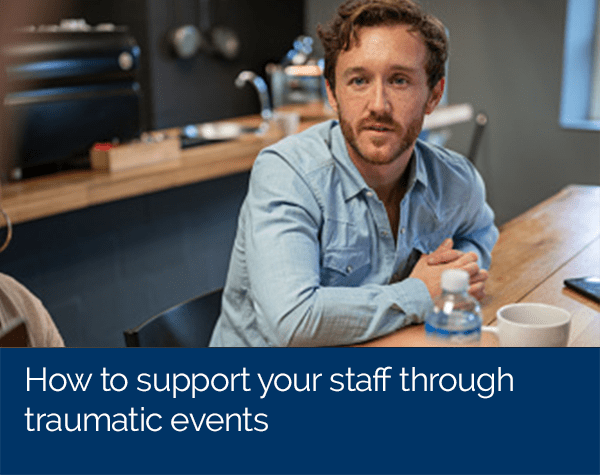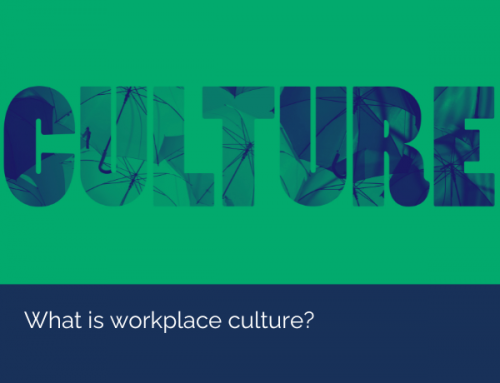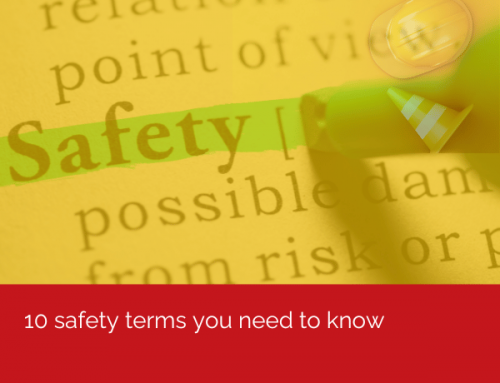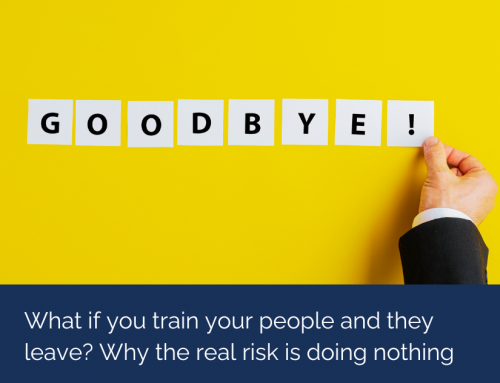
In today’s connected world, our near-constant exposure to news and social media means we often are exposed to traumatic events.
This exposure, along with the challenges of natural disasters, rising living costs, work stresses, and family relationships, can contribute to trauma, affecting employees either directly or indirectly.
As a colleague or supervisor, what can you do to support workmates dealing with trauma?
Understand individual responses to trauma
Everyone responds to trauma differently; there’s no universally “right” way to handle it. Some people might need to talk about their feelings and experiences, while others prefer to remain silent. Some may struggle to concentrate or withdraw socially, while others might talk more than usual. Some will show their emotions openly, whereas others may appear unaffected.
What remains consistent, however, is what they need from you as a colleague or manager: listening, understanding , support and referral.
Listen
To truly listen means to be fully present. If someone is ready to talk, avoid interrupting with your own reactions to the events, such as saying, “aren’t you angry at those darn politicians?” Such comments can project your own views or expectations onto their experience, or inadvertently suggest how they should feel. True listening isn’t about judging their reactions or pressuring them to speak if they choose not to.
Listening involves being fully present with the individual, giving them the freedom to share as much or as little as they choose. It’s about respecting their perspective and providing the space they need to express their feelings in their own terms. Keep in mind, their response is a normal reaction to the situation or a traumatic event. Allow them to articulate their emotions in a way that feels right for them.
For some tips on becoming a better listener, see Listen Up! Eight essential listening skills for leaders.
Acknowledge
“I used to think the worst thing in life was to end up all alone. It’s not.
The worst thing in life is to end up with people that make you feel alone”.
Robin Williams
Recognise and validate their feelings. When you acknowledge someone’s emotions, it helps them feel supported and understood. Statements like “I can’t imagine how frightening that must have been for you” are effective because they demonstrate empathy without assuming you fully understand their experience. Remember, each person’s reaction will vary—some may feel sad, angry, or scared, while others might feel frustrated. Acknowledge these feelings as valid and unique to their experience.
Avoid suggesting how they ‘should’ feel or what they ‘should’ do to alleviate their distress. Such remarks can make them feel misunderstood and dismissed. Instead, by being present and listening deeply, and by acknowledging their feelings genuinely, you help them feel truly heard and supported, ensuring they don’t feel alone in their experiences.
Support
It’s important to distinguish between listening and acknowledging versus counselling and it’s important to recognise the limits of your role. As managers or colleagues, our role isn’t to “fix it” or provide counselling at work, but rather to support our team members in the most effective ways possible which includes encouraging them to seek professional help for psychological challenges associated with trauma.
Your role is to listen, acknowledge and support. This support can extend to practical assistance, such as offering flexible working hours, the option to work from home, time off, or help with essentials like food, clothing, and housing. It might also involve reducing their workload. These forms of support demonstrate your care and concern without overstepping professional boundaries.
Refer
Never attempt to offer counselling unless you are trained and qualified. Trauma is complex to understand and manage, and well-intentioned but unqualified attempts to address it can inadvertently cause harm. Your role should be to facilitate referrals to appropriate services such as Employee Assistance Programs (EAP), chaplains, HR, mental health professionals or the support services listed below.
Additionally, the workplace is often a sanctuary for those affected by trauma, and blurring the lines by trying to facilitate emotional processing on the job can lead to unintended consequences – so your role should be to provide immediate support and refer employees to professional help.
Listen – acknowledge – support – refer. Four simple steps can make a huge difference.
You may also be interested in exploring this supporting article: Navigating the difference between wellbeing and wellness at work.
Where you or your staff can get support
Lifeline
13 11 14
Lifeline provides free, 24-hour Telephone Crisis Support service in Australia. Volunteer Crisis Supporters provide suicide prevention services, mental health support and emotional assistance, not only via telephone but face-to-face and online.
Beyond Blue
1300 22 4636
Beyond Blue is an Australian independent non-profit organisation working to address issues associated with depression, suicide, anxiety disorders and other related mental disorders
Embrace Multicultural Mental Health
(02) 6285 3100
A national platform for multicultural communities and Australian mental health services to access resources, services and information in a culturally accessible format.
Headspace
1800 650 890
Free online and telephone service that supports young people aged between 12 and 25 and their families going through a tough time.
Suicide Call Back Service
1300 659 467
The Suicide Call Back Service offers 24/7 free counselling and support for people at risk of suicide, carers and bereaved.
Mensline
1300 78 99 78
Call Mensline 24/7 for telephone and online support for men with emotional health and relationship concerns.
Kids Helpline
1800 55 1800
Kids Helpline is 24/7 free and confidential phone and online counselling service for young people aged 5-25.






